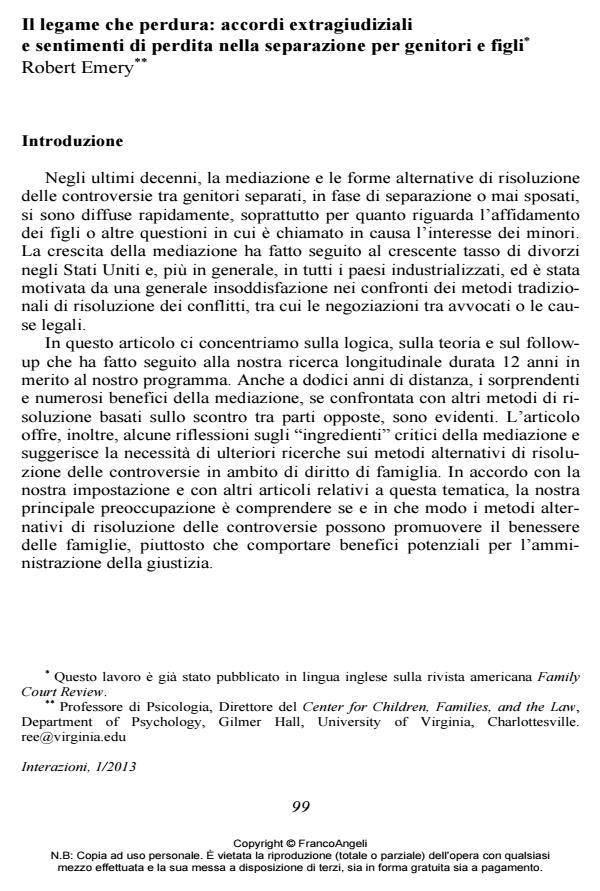The enduring link: extrajudicial agreements and feelings of loss for parents and their children
Journal title INTERAZIONI
Author/s Robert Emery
Publishing Year 2013 Issue 2013/1
Language Italian Pages 16 P. 99-114 File size 517 KB
DOI 10.3280/INT2013-001008
DOI is like a bar code for intellectual property: to have more infomation
click here
Below, you can see the article first page
If you want to buy this article in PDF format, you can do it, following the instructions to buy download credits

FrancoAngeli is member of Publishers International Linking Association, Inc (PILA), a not-for-profit association which run the CrossRef service enabling links to and from online scholarly content.
Starting from the ’80s, Robert Emery promoted a family mediation program carried out in a Court in the state of Virginia. The program aimed at evaluating the efficacy of family mediation compared to other adversarial dispute resolution methods; the underlying hypothesis was that mediation was capable of saving divorcing partners the pain of undergoing highly conflictual trials that would then inevitably lead to a further deterioration in their relationship, as well as prevent the wound of divorce from becoming even deeper. The article presents the results of a longitudinal research developed on the basis of this experience. The study proves to be a key point of reference in the international scenario for the investigation of the outcomes of family mediation as a method for dealing with divorcing/separating partners or partners who have already undergone the divorce/ separation process- and helping them reach shared agreements on child custody. The research sample involved 71 couples that appeared in front of a Court in order to solve their disagreements with regards to child custody; 35 of these couples were randomly assigned to mediation and asked to attend an 11 hours program, whereas the remaining 35 couples went to Court and preceded with an adversarial trial. All the families in the sample were followed for 12 years after the study. Results of the follow up carried out immediately after the divorce and the conclusion of the legal proceding did not show any difference between the two groups (families that were assigned to mediation and families that, instead, were involved in adversarial dispute resolution methods). However, 12 years later, significant differences were found between the two groups, in particular in terms of the frequency of contacts between the child and his/her non resident parent: parents who had attended the mediation program were much more likely to have both physical and telephonic contacts with their children. Moreover, non resident parents in the mediation group were more willing to share their children’s problems and take conjoint decisions with their former spouse. Finally, couples who attended mediation managed to solve their controversy and find and agreement in half of the time needed for couples in the adversarial group.
Keywords: Family mediation, divorce, Court, parental cooperation, alternate dispute resolution techniques.
Robert Emery, Il legame che perdura: accordi extragiudiziali e sentimenti di perdita nella separazione per genitori e figli in "INTERAZIONI" 1/2013, pp 99-114, DOI: 10.3280/INT2013-001008